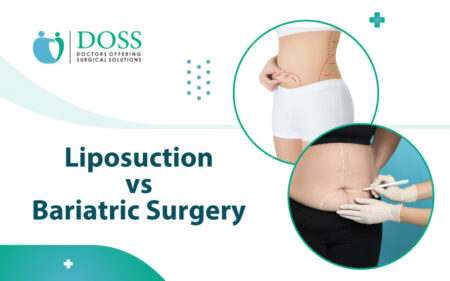Differences Between Liposuction and Bariatric Surgery
BlogAre you considering a surgical procedure for weight management or body contouring? With the increasing popularity of liposuction and bariatric surgery in India, it’s essential to have a comprehensive understanding of these options to make an informed decision.
We will delve further into liposuction and bariatric surgery, outlining their goals, ideal candidates, procedures, recoveries, risks, and long-term outcomes.
By understanding the nuances of each procedure, you can confidently choose the most suitable approach based on your health goals and circumstances.

Liposuction - Sculpting Body Contours
1 Purpose and Focus:
Liposuction is a cosmetic surgical procedure that removes localized fat deposits and improves body contours. Unlike bariatric surgery primarily focuses on weight loss, liposuction is designed for aesthetic enhancements.
2 Candidacy and Ideal Candidates:
- Evaluate whether you are close to your ideal weight but struggle with stubborn fat pockets despite diet and exercise.
- Consult a board-certified plastic surgeon to determine if you are a suitable candidate for liposuction.
- Have realistic expectations about the procedure’s results, as it is not intended as a weight loss solution.
3 Procedure and Mechanism:
- Research techniques such as traditional liposuction, laser-assisted, or ultrasound-assisted liposuction.
- Schedule a consultation with a qualified bariatric surgeon to discuss the best technique for your needs.
- Understand the risks and benefits associated with each technique to make an informed decision.
4 Immediate Results and Considerations:
- Recognize that liposuction provides immediate improvements in body contours.
- Maintaining the results requires a healthy lifestyle, including regular exercise and a balanced diet.
- Consult with a nutritionist or dietitian to develop a post-operative meal plan that supports your body’s recovery and long-term results.
Must Watch this Video
Bariatric Surgery - Weight Loss and Health Transformation
1 Purpose and Focus:
Bariatric surgery encompasses procedures aimed at significant weight loss and addressing obesity-related health conditions. Unlike liposuction, the primary goal of bariatric surgery is to promote weight loss and improve overall health.
2 Patient Criteria and Eligibility:
- Consult with your expert bariatric surgeon to determine if you meet the criteria for bariatric surgery.
- During the consultation, discuss your medical history, current health conditions, and weight loss goals.
- Understand bariatric surgery’s potential risks and benefits and how they apply to your situation.
3 Types of Bariatric Surgery:
- Research different types of bariatric procedures, such as gastric bypass, gastric sleeve surgery, or gastric banding.
- Consult your weight loss doctor to determine the most suitable procedure for your weight loss goals and health conditions.
- Understand the mechanism of each procedure and its implications for long-term weight loss and health improvement.
4 Weight Loss and Health Benefits:
- Recognize that bariatric surgery can result in significant weight loss and improve obesity-related health conditions.
- Discuss potential changes to your lifestyle, including dietary modifications and exercise routines, with a nutritionist or dietitian.
- Seek support from a bariatric support group or counselor to navigate the weight loss transformation’s emotional and psychological aspects.
5 Long-Term Outcomes and Lifestyle Changes:
- Understand that successful long-term outcomes require a commitment to lifestyle changes.
- Follow the post-operative instructions provided by your bariatric surgeon, including dietary guidelines, exercise recommendations, and follow-up appointments.
- Consider ongoing support through follow-up care, counseling, and participation in support groups to ensure continued success.
Also, Read- Bariatric Surgery Types and Procedures
Choosing the Right Approach
1 Factors to Consider:
- Evaluate the amount of weight to be lost and the presence of obesity-related health conditions.
- Consider individual goals, lifestyle preferences, and personal circumstances when choosing between liposuction and bariatric surgery.
- Seek professional advice from qualified surgeons to understand each procedure’s potential outcomes, risks, and benefits.
2 Consultation and Professional Advice:
- Schedule consultations with plastic and bariatric surgeons to gather information and recommendations.
- During these consultations, ask questions about the procedures, recovery, expected results, and long-term implications.
- Discuss any concerns or doubts with the surgeons to ensure a clear understanding before deciding.
Also, Read- Benefits of Bariatric Surgery
Conclusion
In summary, liposuction and bariatric surgery are distinct surgical procedures with different goals and outcomes. Liposuction improves body contours by removing localised fat deposits, while bariatric surgery aims at significant weight loss and addressing obesity-related health conditions.
When considering these procedures, consulting with expert bariatric surgeons who can provide personalized advice based on your unique circumstances is crucial. They will assess your eligibility, discuss potential risks and benefits, and guide you toward the most suitable approach.
Remember, liposuction is not a weight loss solution but a way to sculpt and refine specific body areas. Liposuction may be a viable option if stubborn fat pockets persist despite diet and exercise.
On the other hand, if you are struggling with obesity and its associated health conditions, bariatric surgery may offer the opportunity for significant weight loss and improved well-being.
However, it requires a commitment to long-term lifestyle changes and ongoing support.
Choosing between liposuction and bariatric surgery depends on your goals, health conditions, and preferences. Take the time to explore both options, gather information, and seek professional advice.
By making an informed decision, you can embark on a journey towards achieving your desired outcomes and improved quality of life.


 +919011100010
+919011100010 


